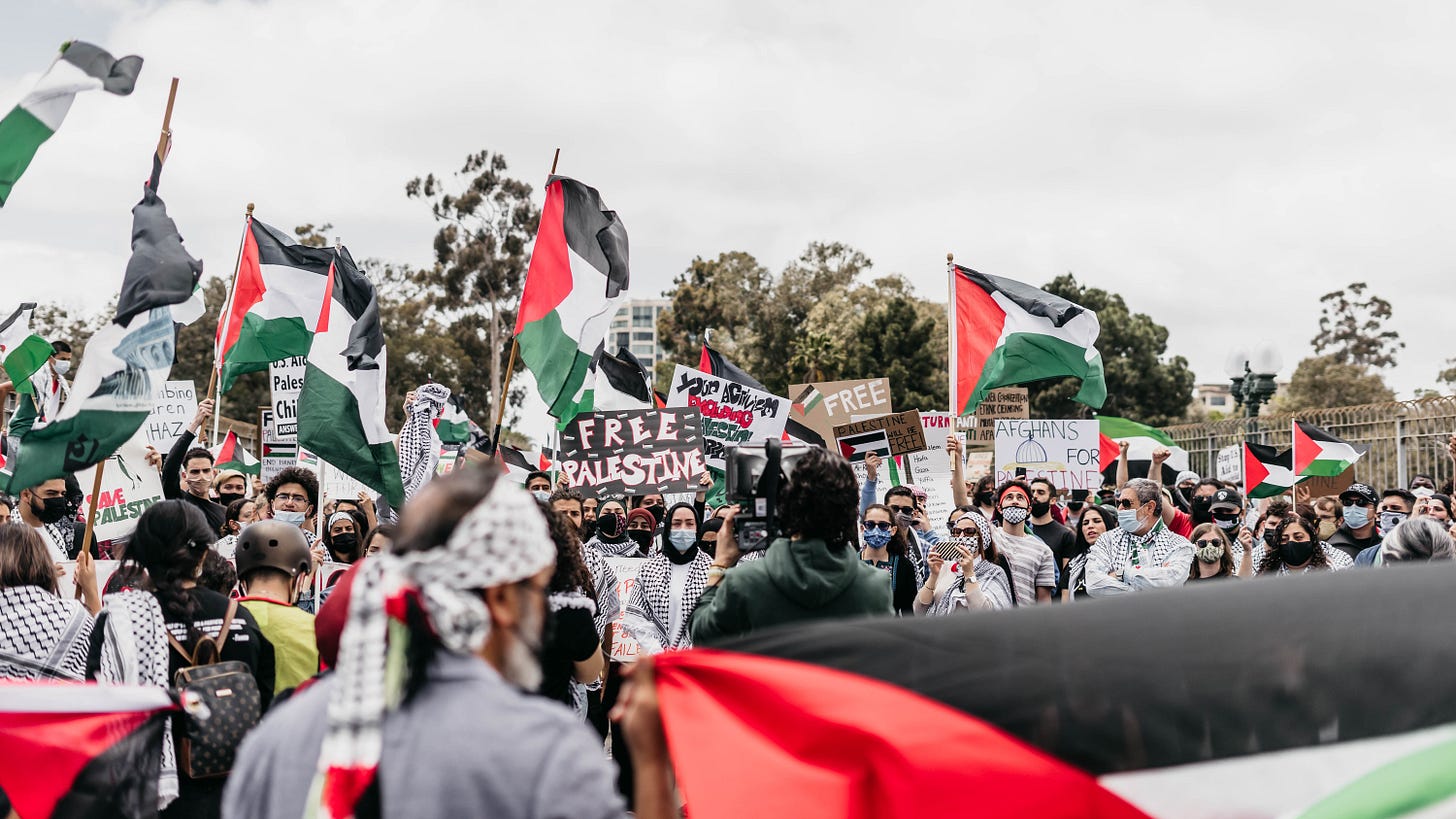Feeling Paralyzed by the news on Gaza?
Ten Tips To Fight back against helplessness occupying our minds and hearts
I was visiting a community in Chicago this past weekend for a program when one of the organizers shared an interesting observation; most of the congregation attending the Friday prayer were calm, silent, and surprisingly compliant as they walked into Jumaa. The answer was obvious for everyone who is following the news in Gaza. The Muslim community in the US, and by extension worldwide, are basically traumatized by the Israeli genocide. Emotions of helplessness, rage, anger, disbelief are seeping through the worldwide Muslim scene.
Yes, it is a healthy sign of faith when we follow the rules or when we care for the struggle of our Umma (global Muslim community). However, it is concerning when such feelings cripple us from our daily responsibilities, which may hurt - in a collective sense - the same cause(s) that we care deeply about . This article is an attempt to liberate our minds and hearts from the occupation of such negative thoughts. It aims at providing a spiritual-emotional cure that will get us out of the spectator seat and invest in uplifting ourselves and our world, inshaAllah.
Ironically, the brave people of Gaza - despite facing a massive amount of trauma - don’t have time for such feelings. If they saw a house burning in front of their eyes, their first knee-jerk reaction is to look for safety. Afterwards, they would jump into action to save lives: call the ambulance (if any), save the children, put out fires, etc. Such actions provide a coping opportunity from such trauma, a privilege that many of us cannot have when watching from a screen. We are left alone with feelings of guilt, doubts, and tirelessly scrolling through our newsfeed. If you are experiencing such parallelizing encounters, you may need to consider some of the following thought-experiments:
1. Start with connecting to the One and Only Changemaker!
In our God-centered worldview, every discussion about activism starts with Allah! Results come from Him, through Him, with His help, and by His blessings. As servants of the almighty, we are commanded to exert our best effort, plan, and work hard, but ultimately detach from the results. This does not align well with most of the modern self-help advice, which attributes results to grit, willpower, hustle, etc.
As activists who care about justice and peace in Palestine and the rest of the world, we should renew our faith in God as the Only One who brings the results. Surah Al Hashr (Chapter 59 in the Quran) offers this perspective by repeatedly reminding the believer who Allah is, what His attributes are, and how He alone helped the early Muslims at the time of the messenger (Peace be upon him) in one of their battles:
He is the One Who expelled the disbelievers of the People of the Book from their homes for ˹their˺ first banishment ˹ever˺. You never thought they would go. And they thought their strongholds would put them out of Allah’s reach. But ˹the decree of˺ Allah came upon them from where they never expected. And He cast horror into their hearts so they destroyed their houses with their own hands and the hands of the believers. So take a lesson ˹from this˺, O people of insight! [Quran, 59:2]
This is why the instruction in the same chapter is to always keep God at the center of your thought process. If we ignore God, our own sense of identity, impact, and being will be lost:
And do not be like those who forgot Allah, so He made them forget themselves. It is they who are ˹truly˺ rebellious.
These verses were discussed as part of our Weekly Dose of the Quran series, feel free to check the recording and subscribe here.
2. Approach your goals as a gardener, not as a carpenter:
A carpenter has a fixated and rigid definition of success for the project he/she might be working on: A chair or a closet need to have specific dimensions, material, description, etc., otherwise it does not meet the expectations. Applying such mindset to our planning and our goals creates unrealistic expectations, frustration, and eventually helplessness, especially when the outcome that we care about is outside of our control.
On the other hand, a gardener mindset offers an alternative worldview to goal setting, which is very helpful when a bigger amount of uncertainty is involved. It encourages us to focus on planting our seeds, choosing the right environment, and improve our routines and day-to-day activities. In addition, it shifts our focus from the product to the process, and detach completely from the outcome. The following Ayah from the Quran teaches the believers such mindset that should apply to every seed that we aim to grow:
Have you considered what you sow? Is it you who cause it to grow, or is it We Who do so? [Quran, 96: 63-64]
For our work on Gaza: we may wish to change policies but end up influencing the public opinion. We may post an article or engage in a debate that does not get enough attention, but end up inspiring someone else to speak out. When we detach from the results, we get a renewed sense of freedom to focus on the knobs that we can turn, the decisions that we can influence, and the micro-actions that drive long-term results. We would be focusing on the process, instead of being obsessed with the product. Eventually and collectively, our capacity as individuals and as a community will grow, by the will of Allah of course. Our confidence and accumulated experience will have a snowball effect, which may happen in a lifetime or after we pass. The irony here is that the only way to drive results is to change the way we measure our progress (what is referred to as: lag measures) and focus on doing our part (lead measures).
3. Be Careful from the “All or Nothing” Mindset
A major deterrent that sidelined a lot of people is the all-or-nothing mindset: We want fast and immediate quick-fix results, otherwise why bother? Our minds have been rewired in the age of instant gratification and are demanding a solution for a century-old problem in few weekends. If we detach from results (step # 2 above) and connect to Allah (step #1), the next step is to stay positive and grateful about the little consistent progress that is taking place. We will stop measuring our efforts in terms of the outcome (which is out of our control) and hone into our maximizing our potential while tapping into our strengths.
Allah does not require of any soul more than what it can afford... [Quran, 2:286]
The implication of this Ayah and mindset is to feel happy and accomplished, and reward yourself for the little effort that you do even if you did not see immediate results. In the grand scheme of things, fulfilling your potential is a GREAT ACHIEVEMENT! and once you add that to the power of the community (see below), miracles will start happening in your life, inshaAllah.
4. Invest in Education
Here’s one thing that’s definitely within your capacity: Educating yourself about the history of Palestine, effective talking points, and the ABCs of media literacy and manipulation. Remember that nothing can hurt a rightful cause more than a terrible lawyer. Get your facts straight. Inform yourself on the history of the matter, and the smartest ways to represent it. Learn how to debate, focus on the main points, and avoid any irrelevant discussions and details.
A good documentary that I normally recommend is: The occupation of the American mind. It sheds light on the Hasbara, the Israeli propaganda strategy that dominated their media manipulation for decades. Luckily, the Palestinian cause is neither ambiguous nor complicated, contrary to the way the biased western media puts it. Just providing some background and context can provide a huge amount of clarity to people around you. There is a reason Prophet Muhammad PBUH gave a huge analogy to the superiority of a scholar over a worshipper. The scholar has an impact that is as massive as that of the messenger himself:
“The virtue of the scholar over the worshiper is like my virtue over the least of you. Verily, Allah, His angels, the inhabitants of the heavens and earth, even the ant in his hole and the fish, send blessings upon the one who teaches people what is good.” [Hadith, Tirmidhi]
5. Be Careful from Outdated Tools and Methods

Two young brothers asked completely different questions after my lecture: one was asking about the impact of certain chants and activities in a Palestine protest, basically trying to use methods that were popular in the 1980s. The other young man was concerned that he cannot share posts of support on social media, for fear of backlash from his employer or graduate program.
I answered both of them with almost the same question: who said that these are the ONLY ways one could display support, influence public opinion, and mobilize the community? Allah has created us and molded us into diverse personalities, talents, and preferences, and that’s exactly how our target audience are created as well. The requirement here is to be intentional and methodic about engaging people in a conversation, regardless of the medium. Be playful, smart, and work within the means and constrains that apply to your specific situation. This diversity in approach was also a mindset that the companions of the messenger PBUH had. Some companions like Bilal Bin Rabah chose to challenge the Quraish torture with the chant: Ahad, Ahad! (one God, one God) and refused to tone down his defiance to their cruelty. Others chose to take the easy route and even hid their commitment to the new religion, such as Ammar Bin Yasir. There is no one-size-fits-all solution when it comes to activism:
And never would it befit the believers to mobilize collectively. So why should there not be, of every section of them, a faction which mobilizes to study the religion and to warn their people when they return to them, so that they may beware? [Quran, 9:122]
6. Stick to the Community
I do not deny that there are some benefits to attending rallies and communal activities for the cause. Yes, they do indicate that a larger population of people cares for something, and they offer some form of moral support for the ones being oppressed (imagine how bad the oppressed will feel if no one reacted to their injustice). In addition to all that, I argue that the biggest impact of such congregation is on the protestors themselves: they help the attendees feel connected to a greater community of like-minded people. They give them much-needed validation that there is still hope in the world, and that people could get out of their comfort zone in support to innocent children they have never met.
Even if you cannot attend such protest, the message here is that you don’t have to agonize about the news alone! Find a community of support, pray with them, share your fears and concerns, and stick to the congregation:
And patiently stick with those who call upon their Lord morning and evening, seeking His pleasure. Do not let your eyes look beyond them, desiring the luxuries of this worldly life. [18:28]
7. Build your Ark:
Prophet Noah was commanded to build his ark in a place that was miles away from any water body. He may not have known when and how he will be using it. He received more bullying and backlash from his community. All that did not persuade him from his goal, from his project, from his super long-term plan:
So he began to build the Ark, and whenever some of the chiefs of his people passed by, they mocked him. He said, “If you laugh at us, we will ˹soon˺ laugh at you similarly. [11:38]
This idea is inspired by the late Shiekh Muhammad Alshareef (رحمه الله) who definitely invested ALOT in building multipe arks for our community. Adopting this approach is the antidote to the instant gratification and carpenter mindset paralyzing us from doing useful work. Once we take our best shot at identifying our impact project (more on this in a future post), need to detach from results and start the grind. Whether it was a matter of building institutions, teaching young children, establishing economical and political influence, writing a book, etc. we need to worry less about when and how our ark will be utilized, and work hard to finish what we started.
8. Resist the Urge to Check the News Frequently
We all know that continuous consumption of the news and analysis reports will never help the people we care about, but we fall for it and tend to stay hooked to our screens. This has to do with the way the news industry is engineered to grab our attention: The red banner, the flash updates, alerts, etc. all tap into our deep survivor instincts.
It will interrupt our long term thinking and destroy any attempt for deep flow (I suffered from these interruption while trying to finish writing this article).
What can we do about it? we have to limit our checking of news to fewer updates per day, while using some productivity hacks (e.g. pomodoro technique) to finish our work uninterrupted. If you get a sense of FOMO (Fear of Missing out), remind yourself that you can always check the news after you finish the task at hand. Unless there’s a major disaster in your home or neighborhood that requires you to run for your life, everything else can wait.
9. Pray for yourself and for the Umma at large:
In addition to praying for the oppressed, we need to pray for ourselves as well. The Muslim Umma at large is heavily affected by the tragic events in Palestine, without of course forgetting the pains of many other countries and communities. In a sense, our victory in our personal battles is their victory, and our defeat could affect theirs. Prophet Muhammad PBUH taught a companion a dua that seeks refuge in Allah from all kinds of defeats, starting from the individual level and ending at the communal:
“O Allah, I seek refuge in You from anxiety, sorrow, disability, laziness, cowardice, miserliness, the burdens of debt, and the defeat of men (in the battlefield).” [Hadith, Bukhari]
اللهم إني أعوذ بك من الهمِّ والحزن، والعجز والكسل، والجبن والبخل، وضلع الدَّين، وغلبة الرِّجال
10. Accept our Human Weakness
Part of the feeling of helplessness that we are experiencing is the illusion of power and control that we have in this world. We overemphasize what we can achieve, both in the spiritual and physical realms, and we get disappointed when we don’t get the results that we want. To this point, it may help us to think that even the best generation of believers, the companions of Prophet Muhammad PBUH, experienced similar moments:
˹Remember˺ when they came at you from east and west, when your eyes grew wild ˹in horror˺ and your hearts jumped into your throats, and you entertained ˹conflicting˺ thoughts about Allah. [Quran, 33:10]
The antidote for this is a renewed since of worship and servitude to Allah. When we assume our ideal status in this world as humble worshipers of the almighty, He will elevate us to realize our potential and maximize our impact. In fact, the Quran clearly states that this was the reason why the believers were victorious in the battle of Badr: by displaying a humble attitude to their creator:
And Allah had very truly given you support at Badr when you were humble. So be mindful of Allah, that you may give thanks. [3:123]
Remember that every calamity and tribulation could be an opportunity to elevate or demote us spiritually, depending on what we make out of it. Try your best to reflect, experiment, and share any of the above-mentioned actions. Feel free to reply with your comments on what worked for you and what didn’t. Remember that we are in this together!
May Allah help us fight feelings of helplessness, toxicity, and negativity with determination, faith, and action
Your brother,
Mohannad Hakeem
PS: Here are some good resources:






